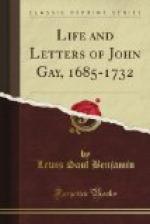“I shall never see you now, I believe; one of your principal calls to England is at an end. Indeed, he was the most amiable by far, his qualities were the gentlest, but I love you as well and as firmly. Would to God the man we have lost had not been so amiable nor so good: but that’s a wish for our own sakes, not for his. Surely, if innocence and integrity can deserve happiness, it must be his. Adieu! I can add nothing to what you will feel, and diminish nothing from it."[10]
* * * * *
Gay’s body was removed from Burlington House on the morning of December 23rd, to Exeter Change, in the Strand, where it lay in state during the day. At nine o’clock in the evening, it was taken for burial to Westminster Abbey in a hearse with plumes of white and black feathers and appropriate escutcheons, attended by three coaches, each drawn by six horses. In the first coach was the principal mourner, Gay’s nephew, the Rev. Joseph Bailer, who is responsible for the above account of the obsequies; in the second coach were the Duke of Queensberry and Arbuthnot. The pall-bearers were Lord Chesterfield, Lord Cornbury, the Hon. Mr. Berkeley, General Dormer, Mr. Gore, and Pope. The service was read by the Dean of Westminster, Dr. Wilcox, Bishop of Rochester. Gay’s remains were deposited in the south cross aisle of the Abbey, over against Chaucer’s tomb.[11] Later a monument was erected to his memory.
Here lie the ashes of
Mr. John Gay,
The warmest friend;
The most benevolent man:
Who maintained
Independency
In low circumstances of fortune;
Integrity
In the midst of a corrupt age
And that equal serenity of mind,
Which conscious goodness alone can give,
Through the whole course of his life.
Favourite of the
Muses,
He was led by them to every elegant art;
Refin’d in taste,
And fraught with graces all his own;
In various kinds of poetry
Superior to many,
Inferior to none,
His words continue to inspire,
What his example taught,
Contempt of folly, however adorn’d;
Detestation of vice, however dignified;
Reverence of virtue, however disgrac’d.
Charles and Catherine, Duke and Duchess of Queensbury, who loved this excellent man living, and regret him dead, have caused this monument to be erected to his memory. Pope, than whom no man loved him better, composed an epitaph for him:—
Of manners gentle, of affections mild,
In wit a man, simplicity a child;
With native humour, temp’ring virtuous rage,
Form’d to delight at once, and lash the age.
Above temptation in a low estate,
And uncorrupted e’en among the great.
A safe companion, and an easy friend,
Unblam’d through life, lamented in thy end:
These are thy honours! not that here thy bust
Is mix’d with heroes, or with Kings thy dust;
But that the worthy and the good shall say,
Striking their pensive bosoms—Here lies Gay.




